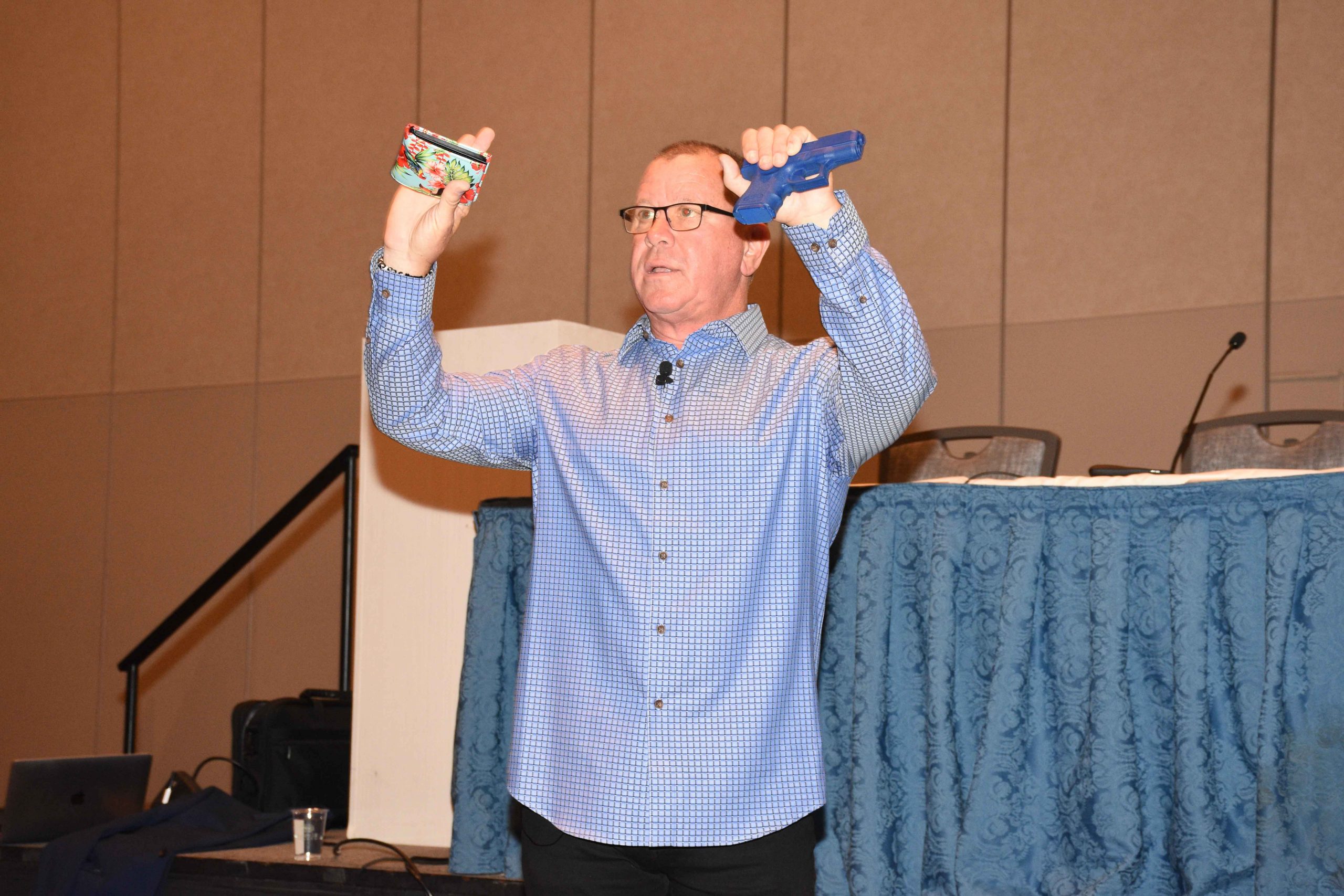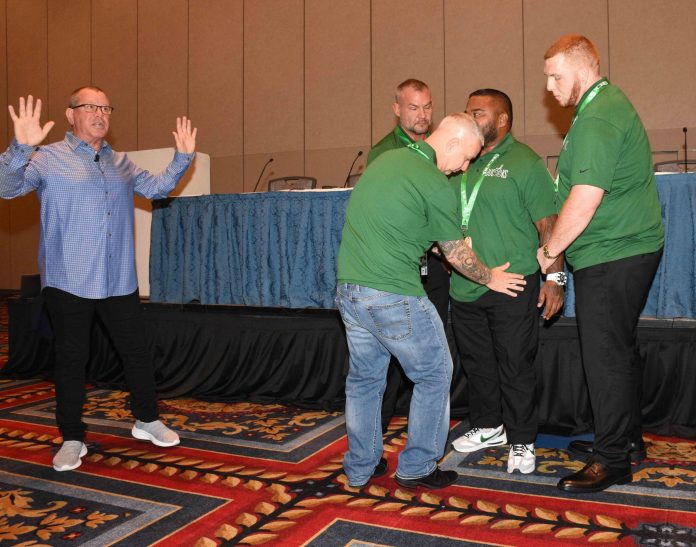Nightclub Security Consultants’ Robert Smith recaps his EXPO 2023 presentation on legal search and seizure, and provides further context into the Fourth Amendment to the US Constitution and how it applies to you.
(NOTE: This story appears in the January 2024 issue of ED Magazine.)
W
hen I was asked to speak at the last EXPO, I knew almost immediately the topic I wanted to present. I had just finished a training session, and when done, the client asked me to help with their decision to create a strategy to prevent any sort of gun violence in their venue. This request was becoming more and more common, and I knew there were more owners that could use this information. I knew this was the topic to present.
Readers, please remember these two things.
1. The most common club or bar shooting occurs when the guest enters with a concealed handgun and after an altercation, pulls their weapon and starts shooting.
2. The second most common club or bar shooting occurs when a guest has entered with their concealed handgun and while they are being held or detained by floor hosts, the guest pulls out their gun and starts shooting.
Searching guests and bags at the door has long been completely taboo for any club operator. The visual of guards searching guests was believed to send the message that the club must be dangerous. This is simply not true any longer, and hasn’t been since the coming of age of millions of young people called the “Lockdown Generation.” This group of young people, born around and after April 1999, grew up through the Columbine High School massacre and have become used to school lockdown drills and mass shootings.
For this generation of young people, being safe in public or in public spaces is foremost in their minds. Going through security checkpoints and magnetometers, as well as having purses and bags checked for weapons is normal. And when asked, seeing a club that is doing searches of guests and bags at the door makes them feel safer and more secure.
Proper searching of guests and bags at the door will stop most weapons from entering. It will also deter those who want to carry any sort of weapon into the club. And a nice bi-product is that your target audience will be accepting your door searching policy.
The second type of search would be done on a rarer occasion, but it is an equally important type of search. When I train and discuss this second type of search, I’m always asked by owners or managers, “Robert, is that legal?” I give my standard direct reply, “YES, completely legal,” then explain the facts.

What I teach is that after any violent act or fight, once the combatants are safely detained or held, the searcher should stop for a few extra seconds and then search that one or more guests for any weapons and identification. Simple, easy and legal.
I teach the owner, the manager and employees two important points. First, the second most common hospitality shooting occurs after a fight or a violent incident when the guest pulls out their gun and starts shooting.
And, secondly, this type of search is totally legal because the 4th Amendment of the Constitution surrounding legal search and seizure does not apply to any private person in our country, including all club or bar employees.
If you want to read more about the Fourth Amendment, please read the accompanying sidebar. If you need to ask your club attorney, please do. But, trust me, my interpretation and use for this article is correct and has never been challenged for 24 years. In short, remember that the Fourth Amendment protects everyone from any illegal or unlawful search and seizure from the government (government agency, police, etc.).
Searching guests and bags at the door has long been completely taboo for any club operator. The visual of guards searching guests was believed to send the message that the club must be dangerous. This is simply not true any longer.
– Robert Smith
If owners or employees still have concerns with my fact-based training, before moving on, I let them read a few court decisions regarding private citizens and the 4th Amendment. Here are 4 cases concerning security guards (private citizens):
• Burdeau v. McDowell, 256 U.S. (1921) – Private guard searching while not acting as a “state agent”
• State v. Buswell, 460 N.W.2d 614 (Minn. 1990) – Private guard searched car, drugs found – not “state agent.”
• United States v. Mayes, No. 18-5902 (6th Cir. 2019) – Private guard, patted down, found gun – not “state agent.”
• United States v. Green 2020 WL 5539804 (7th Cir. 2020) – Private guard, questionable stop, then searched – not “state agent.”
These cases all surround private security guards, like club floor hosts or bouncers, who detained and searched a person. NONE were acting with help of police or on the direction of police. All searches were deemed legal and not a violation of the 4th Amendment.
In closing, searching guests at the door is a practice that is now widely accepted among the 21 to 31-year-old guests, and they feel safer when they see searching at the door. Searching at the door can stop most, if not all, weapons from entering the club.
Secondly, if the gun does get into your club, to prevent it from being pulled after an altercation, please start searching the guest who was detained after an altercation or fight. This search is legal and can prevent unwanted gun violence.
As always, consult with your attorney if you need, or simply do your homework. Good luck and be safe.

Do you really know the Fourth Amendment?
The Fourth Amendment reads: “The right of the people to be secure in their persons, houses, papers and effects, against unreasonable searches and seizures, shall not be violated, and no Warrants shall issue, but upon probable cause, supported by Oath or affirmation, and particularly describing the place to be searched, and the persons or things to be seized.” This succinct yet powerful statement lays down several fundamental principles that guide its interpretation:
• Protection against Unreasonable Searches and Seizures: The Fourth Amendment primarily serves to protect individuals from government intrusion into their personal lives, property and belongings without just cause.
• Requirement of Probable Cause: Before issuing a warrant for search or seizure, the government must demonstrate probable cause, meaning there must be a reasonable basis to believe that a crime has been committed and that the items sought are related to that crime.
• Specificity: Warrants must specify the place to be searched and the items or individuals to be seized, preventing broad, indiscriminate searches.
• Oath or Affirmation: To obtain a warrant, law enforcement officials must provide sworn testimony or affirmation to a neutral magistrate, establishing the need for the warrant.
The Fourth Amendment protects us from unreasonable search and seizures of our person, our house, our papers and our effects. In many cases, this amendment governs our interactions with the police.
Before the government—including police officers—can search your home or seize your property, there needs to be a good reason. This is the big idea behind the Fourth Amendment’s warrant requirement. The government needs particularized suspicion—a reason that’s specific to each suspect—before it can get a warrant.
Broadly speaking, our Constitution says that the police should only be able to invade a person’s rights to privacy, property or liberty if they have a specific reason to think that the suspect has done something wrong.
Robert C. Smith is the President and CEO of Nightlife Security Consultants (NSC), Inc. His company has trained over 10,000 hospitality employees and worked with over 1,500 alcohol service venues nationwide. The unique training created and offered by NSC covers the topics such as conflict resolution, legal use of force, premise liability, recognition of bad ID, active shooter awareness and more. Based on his successful training solutions, Smith has been called upon to provide expert guidance for attorneys, insurance companies, law enforcement officials and industry trade associations surrounding areas of liquor and premise liability.
Smith’s training programs and expertise have been reviewed by state courts and insurance companies and have been deemed well above the “Hospitality Industry Standard of Care” surrounding training and education of bar and club security employees. Now retired, after 20 years as a San Diego Police Officer and Detective, Smith continues to teach and train to help lower liquor liability for all liquor-licensed establishments. You can reach Robert Smith on Twitter @bouncercoach or email rsmith@nightclubsecurity.com.





























